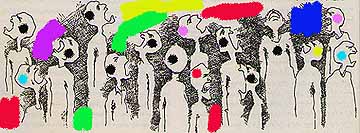

Design based on an original in Iran-e Farda, published in Tehran

Abdolkarim Soroush probably wouldn't attract a second glance on the underground.
He is balding, bearded and bespectacled, and looks an unlikely candidate
for the job of visionary.
But that is how many Iranians view this quiet professor of philosophy and ethics from Tehran University. Dubbed the Martin Luther of Shi'ite Islam for his reformist ideas. Dr. Soroush has been receiving a pop star's welcome at lecture halls around London as Iranians living in Britain gather to hear him speak.
Back home, Dr. Soroush is hounded by radical groups, subject to frequent arrests and banned from teaching. His views on the need for Islam to let in the fresh air of debate and to endorse the concept of human rights have made him the chief ideological thorn in the side of Iran's religious authorities .
One of his main arguments is that there are essentials in Islam which cannot be changed - and then there are what he calls "accidentals of history" stemming from the time and society in which the prophet Mohammad was born. It was an accident of history, he believes, that the language of Islam is Arabic. and that the prophet was born in the Arab world, and not elsewhere.
If Mohammad had been born in Germany, for example, his rules on social issues might be different.
Similarly, Dr. Soroush argues, the schism between Sunni and Shi'ite Islam was an accident of history.
Also classified as accidentals by the professor are rules hitherto considered fundamental, such as the laws allowing Muslim me to marry four women, and those which give automatic rights of divorce and custody of children to men.
"All these are accidentals, which can be subjects of discussion [ijtihad]," he said, referring to the concept of interpretive reasoning in Islam.
Iran's silent liberals, and much of its youth, have adopted the professor as their champion. Disbelievers cannot, according to traditional Islam, speak out, but Dr. Soroush believes they too have the right of expression. Liberals and secularists should be allowed, he believes, to participate in politics and publish their views.
"I am for a pluralistic society," he said simply.
It is also time, he said, for Islam to grapple with the concept of human rights.
"ln the Muslim world, we have talked only of duties, not of rights. Having rights is considered a Western concept. In modern civilizations however, believing in God is not a duty, but a right."
Such ideological distinctions are anathema to the leadership of the Islamic Republic and the storm troopers they occasionally dispatch to hound the professor and his supporters. Each time he tries to hold a meeting nowadays, the result is a riot, provoked by hardliners of the Ansar-e Hezbollah.
These young radicals, little more than thugs, are thought to be backed by conservative clerics close to the office of Iran's spiritual leader, Ayatollah Ali Khamenei.
In an open letter last week the group called Dr. Soroush the Galileo of Islam. "We are not prepared to sell out the ideas of the revolution to secularism, or sell the blood of our martyrs." said the Ansar-e Hezbollah letter. The doctor's words, it said, were not philosophy, but temptation.
Western diplomats believe Dr. Soroush to be extremely brave in continuing to express his views despite the growing tide of threats. "He doesn't have a bright future," said one.
But many Iranians are disappointed that the professor has not translated his ideas into an active political platform. A number point to his involvement with the revolutionary regime in its earlier days, as a member of the Council for Cultural Revolution. "He's just one of them, one of [President Ali Akbar] Rafsanjani's group. He's vague, doesn't openly criticize the system," said one critic.
Some critics believe that President Rafsanjani may in the end prove to be his greatest protection from the radicals, particularly as the conservative clerics recently gained the upper hand in parliament and may next year take the presidency.
Dr. Soroush has denied seeking a political future. "I am just a theoretician,"
he said. I let others draw their own conclusions from my ideas."